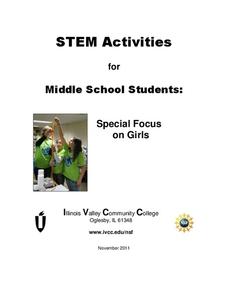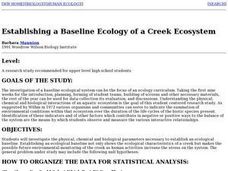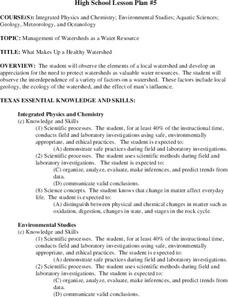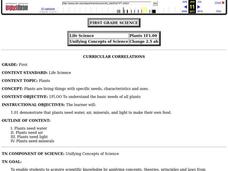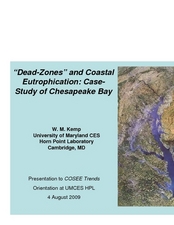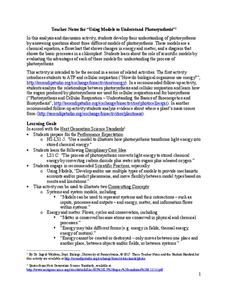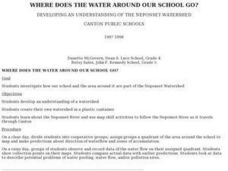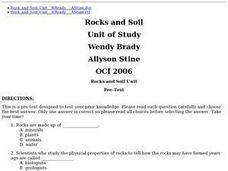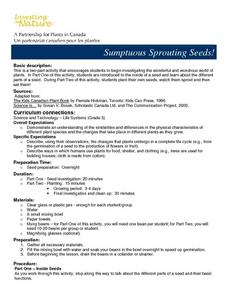Illinois Valley Community College
STEM Activities for Middle School Students
Use STEM activities within the class to provide connections to concepts. The resource includes activities that range from working with buoyancy to building rockets and launching them. Other activities involve the engineering design...
Curated OER
How Much Carbon is Held by the World's Forests?
Seventh graders identify how much carbon is held by the world's forests. For this forestry activity, 7th graders study the carbon cycle and discuss what role humans have had on climate change. Students write a one page paper on how...
Curated OER
Looking At Water: a Walking Field Trip
Fourth graders observe the effects of water on the soil and record those effect by drawing sketches of water erosion and conservation practices.
Curated OER
The Hudson's Ups and Downs
Fifth graders practice interpreting line graphs of the Hudson River water levels to assess the tides and tidal cycles in the estuary. They explore how weather can affect water levels and tides and observe that high tides and low tides...
Curated OER
Establishing a Baseline Ecology of a Creek Ecosystem
Students investigate the physical, chemical and biological parameters necessary to establish an ecological baseline. Establishing an ecological baseline not only shows the ecological characteristics of a creek but makes the possible...
Curated OER
What Makes Up a Healthy Watershed
Students, after observing the elements of a local watershed, explore the need to protect watersheds as water resources for the future. They examine the factors involved with a watershed: geology, ecology, and the effect of man's...
Maryland Department of Natural Resources
Eyes on Dissolved Oxygen
Learn about the factors that affect the way oxygen dissolves in salt water with a chemistry lab. After studying the molecular structure of water, young scientists figure out how aeration, temperature, and organic waste affect...
Curated OER
Meteorology (Condensation)
Second graders define condensation and evaporation. They identify and describe the steps in the water cycle. They ask questions to end the lesson.
Curated OER
Up, Up, and Away
Second graders observe the changes that water has when there is a change in a state of matter. In this lesson they observe the results of applying heat to water with the end result of conversion to a gas.
Curated OER
Plants
First graders explore the specific needs, characteristics, and uses of plants. They discuss the needs of plants as they grow. Students observe plants in various settings as they grow and note the changes they see.
Chicago Botanic Garden
Carbon, Greenhouse Gases, and Climate
Climate models mathematically represent the interactions of the atmosphere, oceans, land, sun, surface, and ice. Part two in the series of four lessons looks at the role greenhouse gases play in keeping Earth warm and has participants...
Curated OER
"Dead-Zones" and Coastal Eutrophication: Case-Study of Chesapeake Bay
Take an in-depth look at nutrient loading, eutrophication, and hypoxia using data on The Chesapeake Bay as an example. This comprehensive presentation includes detailed graphs, photos, and details about the changes in marine organism...
Serendip
Using Models to Understand Photosynthesis
Is your class in the dark about photosynthesis? Shed some sunlight on an important biological process with a thoughtful activity. After answering questions to help determine their level of knowledge, learners work with chemical equations...
Curated OER
Soil Investigations
Middle schoolers examine the basics about soil. In this soil lesson students describe the physical properties of soil and explain what soil profile is.
Curated OER
Rock Cycle SIOP Unit
Young scholars collect rocks, identify them, classify them, investigate their properties, and more. In this rocks lesson plan, students also experiment with soil and erosion and weather.
Curated OER
Mystery Polymers
Students examine how some natural substances are polymers. In this polymer lesson students complete a lab and give examples of a physical change.
Curated OER
What's the Matter with My Orange?
Students use oranges to informally explore decomposition, dehydration, fermentation, the water cycle, bacteria, yeast, food webs, the needs of living things, and physical vs. chemical change over a period of three or more months.
Curated OER
Where Does the Water Around Our School Go?
Students in groups, map quadrants of the area around the school and make predictions about the direction of waterflow and zones of accumulation that will occur when it rains. Then when it does rain they check to see if their prediction...
Curated OER
Rocks and Soil
Middle schoolers explore the physical properties of rocks. They explore the three different types of rocks and are able to compare and contrast their different properties. Students simulate the creation of sedimentary rock, they also...
Curated OER
Chasing El Nino
In this El Nino worksheet, learners review this specific change in the climate cycle by completing 20 short answer questions.
Curated OER
Sumptuous Sprouting Seeds!
Third graders investigate the wonderful and wondrous world of plants. They examine the inside of a seed, explore the different parts of a seed, plant their own seeds, watch them sprout and then eat them! They describe, using their...
Curated OER
Make it a habitat
Students consider the adaptation of life forms through natural selection to fill various niches and accommodate changing environmental conditions. They select an ecosystem and conduct research to provide as much detailed information as...
Curated OER
Hydrology: Flood Mitigation
Twelfth graders discuss the different factors that can contribute to major floods. In this ecology lesson, 12th graders analyze collected rainfall data. They complete a scavenger hunt after the lesson.
Curated OER
Hydrology: Flood Mitigation
Twelfth graders discuss the factors that affect flooding. In this environmental science lesson, 12th graders analyze rainfall data about flooding. They complete a scavenger hunt worksheet using the internet.
